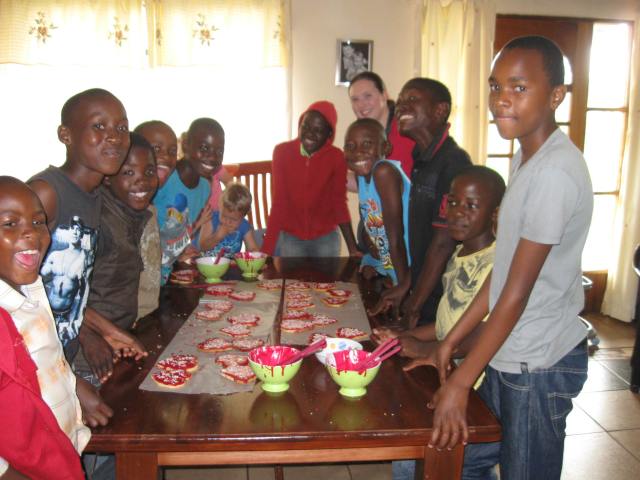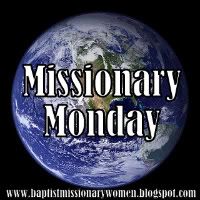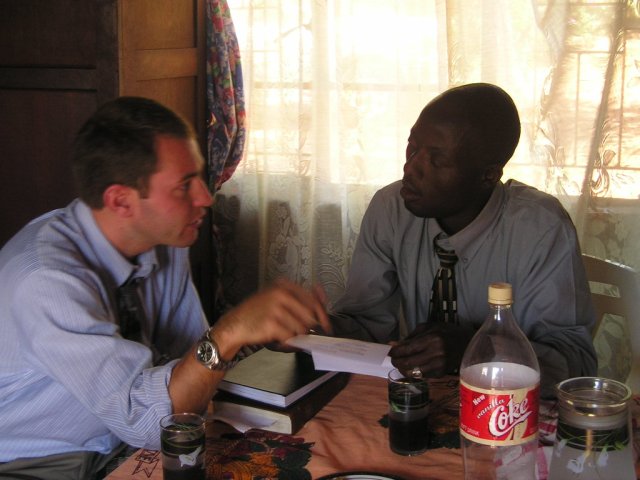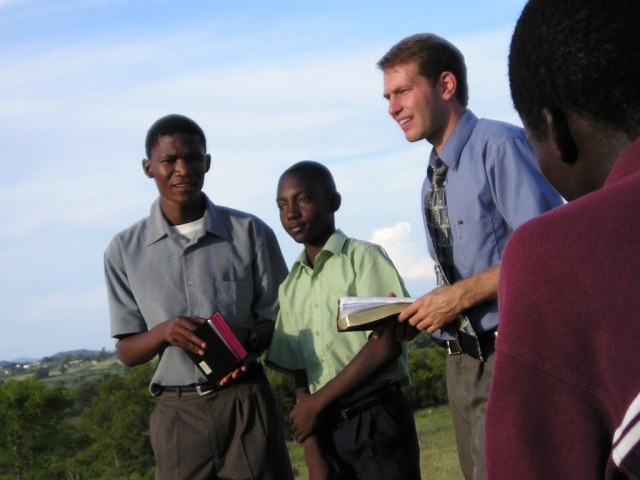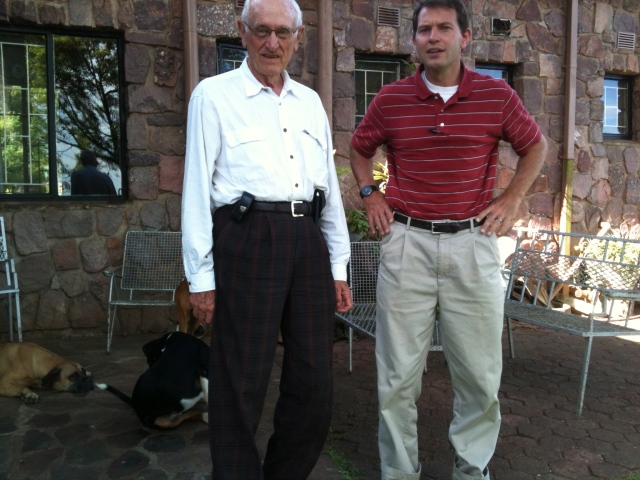I am so excited about something that won't be in my life
anymore. Not because I don't like it, but because I've finished it! Last
week I finished translating the last lesson of our Sunday School
curriculum into Xitsonga. I started this project over six years ago and
finally have finished 212 lessons from A Beka Book's elementary Bible curriculum. Earlier I had translated 32 lessons with Firm Foundations, a chronological approach from New Tribes Mission.
I
usually spent three to four hours per week in translating a lesson plus
review questions, then another hour or so picking out a memory verse
for the week, making memory verse visuals, and practicing teaching the
lesson. I am very excited to have some more time in my week now that
this lengthy project is finished! I am also happy when I think about
national teachers being able to use these materials in the future when
we have hopefully moved on to another church plant.
Once at a
college graduation I attended, a man was awarded an honorary doctorate
for having written curriculum for eight semesters of a one-day-per-week
seminar. I tickled my fancy, awarding myself with an honorary doctorate
for finally finishing this accomplishment. :) Not tooting my own horn,
just enjoying finishing this "chapter." Oh, the work missionary women do
that will go unheard of, unsung, or unnoticed. (By the way, much of
what I write could apply to pastor's wives as well.) So share with me,
are you working on any projects on your field right now? Have you
finished any projects that excited you? I'd love to hear about it!
Showing posts with label learning the language. Show all posts
Showing posts with label learning the language. Show all posts
Monday, October 12, 2015
Monday, July 14, 2014
Lifting Christ Up--Down Under
I thought it would be so interesting for us to have some in-real-life missionaries answer those "Good Questions to Ask Missionaries"
that I posted here a while ago. That way, you can compare fields a
little bit and understand what missions ministry looks like all over the
world. What difficulties are specific to a certain continent or
culture? Perhaps you can apply this information to pray for other
missionaries in a similar field to the lady being interviewed.
Today, meet Jennifer Bauer, the mastermind here at the BMW blog. She blogs about life in Australia at her personal blog Be Thou Exalted. If you haven't gotten enough of our awesome critter stories around here, you would be really interested in the kinds of critters a missionary to Australia has to deal with: The Critters and Creatures in My House.
Today, meet Jennifer Bauer, the mastermind here at the BMW blog. She blogs about life in Australia at her personal blog Be Thou Exalted. If you haven't gotten enough of our awesome critter stories around here, you would be really interested in the kinds of critters a missionary to Australia has to deal with: The Critters and Creatures in My House.
- How many children do you have? What ages?
Autumn (11) and Cody (6)
- Do you homeschool? Name your favorite curriculum that you use (whether just one subject, or an all-in-one):
We do homeschool. Currently we
use ACE. (Here is why I chose ACE for this school year.) But we have used Abeka, Apologia,
Rod and Staff, and a mixture of others.
- Country of service: Australia
- How long have you been there? 2 years, 8 months
- What do you do there?
Currently my husband is interim pastor for a small church, but we were
called here to work with the Indigenous People.
So when the new pastor arrives in two weeks, we will be going full-on
with our new ministry with the Indigenous (Aboriginals).
- Are you learning a language? How is it going? Are you discouraged?
We are planning to learn Kriol, which is the Indigenous language spoken
in our area. Most of the Indigenous
speak English, but we feel it’s important and respectful to learn their
language.
- Success: Have you had any encouragement in ministry recently? Can you tell me two or three things that have encouraged you?
We have had many open doors to go and have church services in the
communities. One cannot just walk onto a
community, you must be invited. My
husband has had many invitations the past few weeks, and we can see the Lord
making the way for us. We’re so excited! I also have my youngest brother visiting for
3 months. This has been a huge
encouragement for me.
- Challenges: What is your greatest challenge in ministry? What other difficulties wear you down?
Although we are quite remote, we still have a stocked grocery store,
wifi, and even a small Target, so in regards to location we are blessed not to
have too many challenges. I think our
greatest challenge in ministry will be reaching the Indigenous men. Alcohol (grog as they call it here) is a
major detriment and a common past time for the men.
- How is your life similar to life in America?
There are many similarities to America.
Although we don’t have some of our favourites (Lucky Charms, Captain
Crunch, Cracker Barrel, etc.) we do have the modern conveniences (indoor
plumbing, wifi, McDonalds, Subway, grocery store 2 minutes away, etc.)
- What are some special benefits you or your family experience from where you’re ministering? (or from being missionaries)
To be able to share the Gospel with someone who has never heard of
Christ is just an amazing privilege.
- What are some positives and negatives of your culture (that you’re ministering to)?
I’m speaking more of the Australian culture rather than Aboriginal
culture here. The positives is the
freedom of religion, a very relaxed, laid back attitude among the people (no
one is ever on time!), and the welcoming of Americans (for the most part, there
are a few Aussies who prefer the Yanks stay home J ). Negative – hmmm…it’s hard to think of any,
but if I had to say one thing, I guess it would be the amount of alcohol that
is consumed here by the Indigenous and the white fellow.
- What sins might a missionary be especially tempted with that another Christian in the U.S. might not?
Not sure how to answer this one.
The only thing I can think of is that nudity can be shown on tv here
after a certain time. As well as any
kind of language.
- What books have you been reading? Do you have any book recommendations?
I am currently reading Growing Up Duggar. I definitely recommend! My favourite missionary books are Evidence
Not Seen by Darlene Diebler Rose and Jungle Pilot by Russell Hitt.
- How can we pray for your people or culture in a general way?
Please pray for us as we begin this new phase in our ministry in working
with the Indigenous People. Please pray
that we are sensitive to the Lord’s leading and to the people we are called to
witness to.
- How can we pray for your family specifically?
That we will continue to grow closer to the Lord, for His safety and
protection while travelling to communities, and as a selfish request, that we
will be able to take a short furlough home for 6 weeks to be with our family
during Thanksgiving and Christmas.
Monday, June 23, 2014
Reaching the Unreached in South Asia
I thought it would be so interesting for us to have some in-real-life missionaries answer those "Good Questions to Ask Missionaries"
that I posted here a while ago. That way, you can compare fields a
little bit and understand what missions ministry looks like all over the
world. What difficulties are specific to a certain continent or
culture? Perhaps you can apply this information to pray for other
missionaries in a similar field to the lady being interviewed.
Today, meet Charity Woon, a fun, thought-provoking contributor here at the BMW blog. She blogs about everything from adventures on the field to homeschooling tips to personal devotions at her personal blog Road Schooling...Our Life on the Road of Life. If you'd like a good gross-you-out story, you might enjoy reading Meat Shop Adventure; or if you'd like to have your heart stirred for evangelism, read her post about heroes of faith across the world, We Will Not Fight Back.
Today, meet Charity Woon, a fun, thought-provoking contributor here at the BMW blog. She blogs about everything from adventures on the field to homeschooling tips to personal devotions at her personal blog Road Schooling...Our Life on the Road of Life. If you'd like a good gross-you-out story, you might enjoy reading Meat Shop Adventure; or if you'd like to have your heart stirred for evangelism, read her post about heroes of faith across the world, We Will Not Fight Back.
- How many children do you have? What ages?
We are a family of seven. My husband's name is Jason, and my
name is Charity. We have three crazy, adventurous, fun children: Ben (15),
Michaela (10), and Gabriel (7). Then there are our two dogs, Chief and MoMo.
(Got to love the furry babies, too! They keep us safe from rats, snakes, and
robbers.)
- Do you homeschool? Name your favorite curriculum that you use (whether just one subject, or an all-in-one):
We are very eclectic in our homeschooling style. We try to
make the schooling experience fit each child the best we can. It is a little
tougher on the field, though, so I have to say Landmark Freedom Baptist is my
favorite "go-to" curriculum. Landmark Freedom
Baptist Curriculum
- Country of service: Southern Asia
- How long have you been there? 19 months
- What do you do there?
We are church planters seeking a location for our first
church, but in the mean time, I play the piano for a young church plant, and I
practice Titus 2 any opportunity I get. Right now my role is more of
hospitality, motherhood, and mentorship, doing my best to demonstrate Biblical
marriage and motherhood to first generation Christians who are hungry to learn
how to parent God's way.
- Are you learning a language? How is it going? Are you discouraged?
Language? Um... It's coming slowly, but surely! I am not
discouraged at all. Some days are better than others, but every day is one day
closer to communicating clearly what God has put in my heart
- Success: Have you had any encouragement in ministry recently? Can you tell me two or three things that have encouraged you?
I... am... growing... strawberries! That may not be
encouraging to you, but for the garden-challenged person like me, it is HUGE!
Why? Our garden has opened up many opportunities to meet and talk to people.
The more it succeeds, the more opportunities we have.
We recently went to visit my husband's language school
instructor and his wife. We were there four hours and I was actually able to
hold a pretty good conversation with them. Definitely encouraging!
It is a blessing to be forming deep friendships with
nationals. God has also supplied a national man to work with my husband in
planting a church.
- Challenges: What is your greatest challenge in ministry? What other difficulties wear you down?
On this field, there are plenty of things to potentially
cause stress, but there is one thing that brings me literally to tears on
occasion. Driving! The roads are very dangerous here. Even the most cautious
drivers have accidents. The rule "look both ways before crossing" doesn't
exist here for drivers, pedestrians, animals, and more. I thought maybe most
third world countries were this bad, until a few very well-traveled people told
us these roads were far beyond what they had experienced in other third world
countries. Every time we arrive home safely it is a clear demonstration of the
grace of God. Driving my little scooter here with two young children in
tow has improved my prayer life dramatically, though.
As far as general ministry challenges? Many fields struggle
with some of the same issues we have. The people here do not know anything
about Jesus or what a Bible is, so we have to start from the beginning...
literally Genesis 1:1! It takes quite a while to share the Gospel clearly. Then
when they do understand, they face the fear of real persecution (losing home,
family, friends, job, etc.) Many women will not go against their husband's
commands if he forbids her to become a Christian.
- How is your life similar to life in America?
Our schooling is very similar. Our bedding style is the
same. At home, our eating is very similar though the preparation is much more
involved. We still have family nights. Shopping? Totally different! Cleaning?
Different. Entertainment? Different. Clothing? Sometimes similar. Housing?
Different for the most part. There are many more differences than similarities.
- What are some special benefits you or your family experience from where you’re ministering? (or from being missionaries)
God has helped us all grow spiritually by putting us in a
place where what is in our hearts is forced to come out. I truly believe God
did not put us here because we have something special to offer. He put us here
because this is where He can make us most like Christ. Thankfully, while we are
here He is choosing to use us for His glory.
- What are some positives and negatives of your culture (that you’re ministering to)?
Positives: The women here work harder
than my American mind can even comprehend. I have also seen people who were
willing to become Christians even when they knew they would lose a home,
family, and more. With the exception of driving, the people here live a less
time-oriented life. The people here know how to survive on next to nothing.
Negatives: Much of their
culture/government/education system is permeated with their religion. In much
of the culture there is a lack of respect for the sanctity of human life. It is
heartbreaking to see such intense child abuse or neglect and not be able to
legally do anything about it. It is a "me first" culture, and yet
they can be some of the most generous people. Lying and stealing are a part of
their culture and is often seen as acceptable. The caste system exists here.
- What sins might a missionary be especially tempted with that another Christian in the U.S. might not?
Honestly, being here has revealed some ugly things in my
heart that in the States I would have never realized were there. In the States,
I never struggled with "road rage." I assumed it just wasn't a
problem for me. God has put me in the right hot water situations here, and
what's in the heart has come out! I am thankful for His patience with me!
Another temptation I battle? Being critical of people in America who complain
about power outages, three days of rain in a row, or having a long drive to
church. Those problems are a way of life here. But being critical is no less of
a sin than complaining.
- What books have you been reading? Do you have any book recommendations?
I am currently reading Don't
Let the Goats Eat the Loquat Trees by Thomas Hale. Love it! Though he was a
medical missionary, I can truly identify with so many things he faced. I just
finished The Choice is Yours by
Terrie Chappell. It was a great "refocusing" book. I treasure her
other book, It's a Wonderful Life.
- How can we pray for your people or culture in a general way?
We desire that this country would continue to head in the
direction of freedom. It has only been in recent years that it became legal for
the people to become Christian, but it is still illegal to influence them in
that direction. Christians are still persecuted. Also, the country needs
political stability. The situation gets pretty ugly during elections.
- How can we pray for your family specifically?
We are about to enter a new phase of life. Our oldest child
has two more years of school before he will go to Bible college in the States.
I am not sure this Mommy will be ready for that, but I am trusting God's grace
is sufficient. Just as He gives saving grace and dying grace, I am sure He will
give "child-going-to-college-10,000-miles-away" grace. In the mean
time, we desire prayers in our preparation for him to finish high school. We
also desire God's direction in ministry as we prepare to plant a new church.
Finally... visa renewal is due! We are hoping to get one-year visas this
time.
Monday, March 31, 2014
WHAT Did You Say?! ~ The Many Jobs of a Missionary, Linguist, Part 3
 Almost every missionary who has learned a new language has a hilarious story or two about his language bloopers.
Almost every missionary who has learned a new language has a hilarious story or two about his language bloopers.Since I write out all my Bible lessons word-for-word, I don’t have too many funny mistakes to share, just average mistakes; but my husband has made some memorable gaffes that I hope will encourage all who attempt to learn a foreign language, that no matter how bad the mistake, just keep trying!
Besides innocuous one-liner funnies, like telling a line of 20 baptismal candidates to hold their sheep (tinyimpfu) instead of their noses (tinompfu), I’d like to share 2 of Seth’s worst, funniest mistakes that we still laugh about with tears and sides aching, and embarrassment!
But first as a warm-up, I’ll share a misunderstanding he had with a neighbor over terminology, which illustrates how the Tsongas will “tsongalize” an English word, and we don’t catch it; and then we laugh later at how they used or abused the English language.
Our neighbors came at 8 PM one night, upset--not at the man's immorality with a woman--but that the woman had stolen some of his paperwork, like his identity book, as well as his “tijokes.” (This guy is quite a character; he calls himself Walker Texas Ranger.) Our neighbor wanted Seth to drive him a couple villages away to retrieve these things, especially the “tijokes.”
Seth was wondering what those were—comic books? Seth tried to refuse, “It’s late!” but eventually, he drove them. Finally when they were almost back home, he discovered that “tijokes” are underwear! (We guessed it comes from the brand name Jockey.) We still tease Seth about his gallant nature in this misadventure of rescuing the man’s "tijokes."
Okay, first BIG blooper:
Upon preaching through Ephesians in youth group, Seth arrived at Ephesians 5:22. At the end of a sermon on Biblical femininity, Seth gave some practical applications to the teen girls. He was trying to translate “don’t initiate” (in the context of guys and girls), and this was yet another example of Tsonga’s limited vocabulary. He took the verb for “be first, or begin” (rhanga), and added the “-isa” ending to it (rhangisa), which changes it to “make first, or to lead.” Then he added the emphatic negative command (not just a simple negative command); like saying, “Don’t ever do this.”
It should have worked! The way he did it would have worked with most verbs; but not this one. The sermon was a total loss after that. The youth tried to control themselves; but I’ll never forget one adult woman who had attended that day, hiding her face in her arms, shoulders shaking from laughter for five full minutes!
One of them finally got up the nerve to explain after youth group. Unbeknownst to Seth, colloquially, the mothers tell their children this word to begin dressing. If there is no direct object after “rhangisa,” it colloquially means, “start dressing,” or more specifically, “Put on your underwear.”
Seth had just told the girls in a mixed youth group, in the context of what to do in relation to guys, “Don’t ever put on your underclothes!” AUGH! The good thing about mistakes like that is that you never forget the language lesson!
Second mistake:
Seth was preaching a sermon on baptism, preparing some baptismal candidates for an upcoming baptismal service. He meant to be reassuring, “You will get in the water, you will get wet, and then you will come out…”
The word for get wet is “tsakama.” He mistakenly added that “-isa” ending again, which literally means “to make wet,” but colloquially means “to urinate.” He told them, “You’ll get in the water, you’ll urinate, and then you’ll come out…”
I'm going first!
I love telling these stories, especially to fellow missionaries, because they can understand, because there is healing in the humility of making fun of yourself and a release from discouragement when you can laugh about it, and because it may encourage others to keep going in their endeavors to learn a language--because it can’t get much worse than this. :)
Monday, March 24, 2014
When Words That Do Not Exist Communicate ~ The Many Jobs of a Missionary, Linguist, Part 2
A missionary must learn the language of the people to whom he is ministering.
This really should go "without saying"; but unfortunately, some missionaries rely on translators for years, making little attempt to apply themselves to the language of the people around them. I have little to say in return to such a missionary. There are so many reasons why it is important for a missionary not only to get by in the language of his people, but also to be a linguist--to study the language in an attempt at eventual fluency. (This job never really ends.)
Why should missionaries be linguists?
Well, probably most obviously, attempting to learn the language communicates love--and humility. When people see a "smart" person (and some Africans think you are smart simply because you do speak English) humbling himself by stuttering out concepts in their home language, it makes you a real, accessible person. So many Africans have been delightedly surprised to hear us greet them in their language. And for some, their delight is unbounded when they hear us converse with them even beyond the greetings. Our first male convert came about because Seth stuck out his hand to shake hands with a security guard at a grocery store and greeted him in Tsonga, "Mi njhani?"
Next, learning the language forestalls errors in translation or miscommunication. Take out the middle man, the translator; and although yes, there are certain concepts the translator will be able to say better than you, once you have learned the language, you may find that there are certain concepts the translator himself didn't understand the way you meant them; and you may be chagrined to find out how he was translating it.
But finally and most importantly, there is a vital connection between language and culture. Learning the two go together. There is a debate about which came first--the chicken or the egg? Or in this case, the culture or the language? When you learn the language, you are gleaning eye-opening information about how those people think. What is important to them, and what isn't? In this case, words that they do not have may communicate just as much as the ones they do have.
Here's how an expert says it:
Words Tsonga Does Not Have
A culture may be just fine missing some words or distinctions, as in the above quoted example of snow; but when a culture is missing certain words, it shows the spiritual state they are in--even their spiritual degradation and danger. Please pray for our dear people and for us as we use with our limited abilities a limited language to explain an unlimited, worthy God.
I am interested to hear from my missionary friends if they have found the same things true in the language in which they minister?
This really should go "without saying"; but unfortunately, some missionaries rely on translators for years, making little attempt to apply themselves to the language of the people around them. I have little to say in return to such a missionary. There are so many reasons why it is important for a missionary not only to get by in the language of his people, but also to be a linguist--to study the language in an attempt at eventual fluency. (This job never really ends.)
Why should missionaries be linguists?
Well, probably most obviously, attempting to learn the language communicates love--and humility. When people see a "smart" person (and some Africans think you are smart simply because you do speak English) humbling himself by stuttering out concepts in their home language, it makes you a real, accessible person. So many Africans have been delightedly surprised to hear us greet them in their language. And for some, their delight is unbounded when they hear us converse with them even beyond the greetings. Our first male convert came about because Seth stuck out his hand to shake hands with a security guard at a grocery store and greeted him in Tsonga, "Mi njhani?"
Next, learning the language forestalls errors in translation or miscommunication. Take out the middle man, the translator; and although yes, there are certain concepts the translator will be able to say better than you, once you have learned the language, you may find that there are certain concepts the translator himself didn't understand the way you meant them; and you may be chagrined to find out how he was translating it.
But finally and most importantly, there is a vital connection between language and culture. Learning the two go together. There is a debate about which came first--the chicken or the egg? Or in this case, the culture or the language? When you learn the language, you are gleaning eye-opening information about how those people think. What is important to them, and what isn't? In this case, words that they do not have may communicate just as much as the ones they do have.
Here's how an expert says it:
Ethnolinguistics, the study of the relationship between language and culture, has shown that languages provide categories through which people think. Languages mirror culture at every point. They emphasize and systematize what is important to the culture and filter out what is not important. For example, Eskimo tribes have as many as seven distinct labels to distinguish between types of snow ("falling snow, snow on the ground, fluffy snow, wet snow, and so forth"), while English has one all-inclusive word for the concept. Equatorial African languages have no term at all for snow but typically expand the word hail to include the idea of snow....
As missionaries evangelize in animistic contexts, they must realize that as outsiders to the cultures they must learn the categories of animistic thought as formulated by cultural insiders....These categories must be understood by the missionary if he is to effectively communicate God's eternal message in contexts where animistic worldviews are present. pg. 45-46, 48 Communicating Christ in Animistic Contexts by Gailyn Van RheenenThe Tsonga language is much less complex and much more limited, especially in words for propositions, than English. We are stymied at times to find ways to communicate important Biblical truths in words that don't exist in Tsonga! Here are some examples, some of which we can communicate through a phrase or approximation, but some of which are simply not there:
Words Tsonga Does Not Have
- Affect
- Eternity, eternal, everlasting
- Condition
- Priority
- Right, wrong
- Moral, immoral
- Valid, invalid
- True, false
- Temporary, permanent
- Proportion
- Mental, doctrinal, intellectual
- Certain, definite
- Specific, particular
- Limit
- Naturally, by nature
- Early
- Law / principle / rule / guideline / direction / standard
- Job / task / role / occupation / work
- Late / prolonged
- Want / need
- Must / might / can / could / should
- Justice / righteousness
- Mercy / grace
- Old / elderly
- Trouble / danger
- Good / great
- Better / best
- Consequences / payment
- Speak / say / mean / communicate
- Worthy / Deserving
- Love / will / like / desire
A culture may be just fine missing some words or distinctions, as in the above quoted example of snow; but when a culture is missing certain words, it shows the spiritual state they are in--even their spiritual degradation and danger. Please pray for our dear people and for us as we use with our limited abilities a limited language to explain an unlimited, worthy God.
I am interested to hear from my missionary friends if they have found the same things true in the language in which they minister?
Monday, March 10, 2014
The Many Jobs of a Missionary ~ Linguist, Part 1
This job goes without saying. Pun intended! :)
Missionaries must learn the language of the people they are ministering to!
When my husband arrived in South Africa in 2004 to work in the villages of the Tsonga people (before we were married), he knew no other missionaries working with the Tsonga people who could teach him the language. There was no language school or Rosetta Stone digital course.
Thankfully, South Africa's national language is English, so several of the nationals had a working grasp of English, some better than others. Seth asked a national pastor that was his sole link to the village to teach him Tsonga. This worked--like a broken wheel--bumpy and uncomfortable for both.
The national pastor, although fluent of course in his native tongue, did not know how to explain the rules and logic of Tsonga to a non-native learner. Would you know how to explain the logic of English to an ESL speaker? And Seth did not know at the time how to teach another person to teach him the language. (Now we have a much better idea of how to tutor someone to tutor us!) Eventually in frustration, the pastor explained that Tsonga was like Greek--no rules, see? Okay, so Seth was back on his own.
Again thankfully, those stronger and better than us had gone before. Swiss missionaries translated the entire Bible into Tsonga in 1907, and so Seth had a Bible and a dictionary in Tsonga, which helped immensely.
My favorite missionary heroes are those linguists who pull a language out of the air and put it into writing for the first time--who labor for years to put the Bible into someone else's language. How can we measure the worth of those who have gone before us making our work so much easier? My eyes teared up recently reading a book for children about missionary translation work called God Speaks Numanggang, by missionary-turned-homeschool-curriculum-provider David Hazell. Frontline missionaries who sweat to translate the Bible are heroes. Praise them with great praise!
So Seth read through Romans and other books of the Bible verse by verse with teen boys, trying to match his accent to their tone. But he still didn't understand the structure of the language.
Well into his first year, he received a tip from an Afrikaner (white South Africans--another thing to be thankful for in this country!) about another Afrikaner who worked for the South African Bible Society for years, mainly in the Venda language, another language prevalent in the villages around us. This man helped to translate the second version of the Venda Bible. He could even preach in Venda. Seth got his contact details and went to visit him.
This was the game-changer. In order to learn the language, we often need help from those who have already done it! This man told Seth of a little grammar book that the old Swiss missionaries had written called Everyday Tsonga, which Seth could purchase at a little Indian shop in a nearby town.
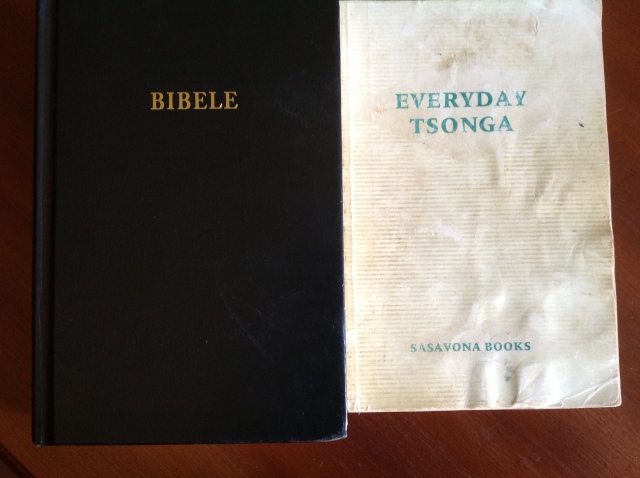
Seth did that immediately, and it opened up to him the structure of the sub-Saharan languages--the African languages south of the Saharan desert. Lesson 7--oh how we praise God for it! It's called "Classes of Nouns and Their Prefixes." Exciting, huh? :)
 Each
lesson had a grammatical term with a "rule" listed underneath. Yes.
Every language has rules. :) Here's how lesson 7's rule began: "In
Tsonga...all nouns are divided into different classes....It is important
that this system of noun-classes should be mastered thoroughly, as it
is the key to a correct speaking of the language. As we progress, we
shall see that any adjective, pronoun, or verb, which stands in relation
to a certain noun in a sentence, is connected with that noun by means
of the repetition of its prefix in one form or another; so that one can
say that it is the noun, which rules the whole sentence." The lesson goes on to give examples.
Each
lesson had a grammatical term with a "rule" listed underneath. Yes.
Every language has rules. :) Here's how lesson 7's rule began: "In
Tsonga...all nouns are divided into different classes....It is important
that this system of noun-classes should be mastered thoroughly, as it
is the key to a correct speaking of the language. As we progress, we
shall see that any adjective, pronoun, or verb, which stands in relation
to a certain noun in a sentence, is connected with that noun by means
of the repetition of its prefix in one form or another; so that one can
say that it is the noun, which rules the whole sentence." The lesson goes on to give examples.
Oh, sweet relief! To our English minds, the verb really rules the sentence. We had no concept for nouns ruling the sentence. But African languages are riddled with tiny little words called "concords" that connect subjects to verbs, get attached to adjectives, and act as the pronoun. If you don't know the concordial system, you can't learn the language!
For example:
In English, we would say, "The bread is good." But in Tsonga, they say, "The bread it is good." And the "it" changes depending on what the subject is. "It" also changes for adjectives like "big" or "small."
Before this grammar book, Seth could not figure out the rhyme or reason for all of these little words throughout the Tsonga language. He would try one version of "it," only to be told that for "bread" it was "xi." So then he would apply "xi" to a person or a table, only to be told that it was "u" or "ri" respectively. He was constantly guessing wrong and didn't know what all those little words meant to the language. It was utterly confusing. Now it seems so obvious to us--now that we have the key!
Since then, we have both learned Tsonga (almost fluently) and bits of Venda (which I have forgotten, but Seth can speak passingly), and now Seth is trying to pick up bits of Shona in order to reach some of the Zimbabweans who have flooded our province of South Africa. Each succeeding African language is easier to learn after jumping the hurdle of the first one.
If you look back on your life, I'm sure you have your own stories of God's providence--literally, His "seeing before." How we learned Tsonga is one story in which we bless God for His providence--His "seeing before" in providing those clever Swiss missionaries to translate the Bible, publish a Tsonga grammar book (in English!), and guiding our steps to meet the people who would introduce us to the grammar.
And now we have begun on our journey to being a linguist--one of the most important jobs of a missionary!
How did you learn the language?
More to come...
Missionaries must learn the language of the people they are ministering to!
When my husband arrived in South Africa in 2004 to work in the villages of the Tsonga people (before we were married), he knew no other missionaries working with the Tsonga people who could teach him the language. There was no language school or Rosetta Stone digital course.
Thankfully, South Africa's national language is English, so several of the nationals had a working grasp of English, some better than others. Seth asked a national pastor that was his sole link to the village to teach him Tsonga. This worked--like a broken wheel--bumpy and uncomfortable for both.
The national pastor, although fluent of course in his native tongue, did not know how to explain the rules and logic of Tsonga to a non-native learner. Would you know how to explain the logic of English to an ESL speaker? And Seth did not know at the time how to teach another person to teach him the language. (Now we have a much better idea of how to tutor someone to tutor us!) Eventually in frustration, the pastor explained that Tsonga was like Greek--no rules, see? Okay, so Seth was back on his own.
Again thankfully, those stronger and better than us had gone before. Swiss missionaries translated the entire Bible into Tsonga in 1907, and so Seth had a Bible and a dictionary in Tsonga, which helped immensely.
My favorite missionary heroes are those linguists who pull a language out of the air and put it into writing for the first time--who labor for years to put the Bible into someone else's language. How can we measure the worth of those who have gone before us making our work so much easier? My eyes teared up recently reading a book for children about missionary translation work called God Speaks Numanggang, by missionary-turned-homeschool-curriculum-provider David Hazell. Frontline missionaries who sweat to translate the Bible are heroes. Praise them with great praise!
So Seth read through Romans and other books of the Bible verse by verse with teen boys, trying to match his accent to their tone. But he still didn't understand the structure of the language.
Well into his first year, he received a tip from an Afrikaner (white South Africans--another thing to be thankful for in this country!) about another Afrikaner who worked for the South African Bible Society for years, mainly in the Venda language, another language prevalent in the villages around us. This man helped to translate the second version of the Venda Bible. He could even preach in Venda. Seth got his contact details and went to visit him.
This was the game-changer. In order to learn the language, we often need help from those who have already done it! This man told Seth of a little grammar book that the old Swiss missionaries had written called Everyday Tsonga, which Seth could purchase at a little Indian shop in a nearby town.

Seth did that immediately, and it opened up to him the structure of the sub-Saharan languages--the African languages south of the Saharan desert. Lesson 7--oh how we praise God for it! It's called "Classes of Nouns and Their Prefixes." Exciting, huh? :)
 Each
lesson had a grammatical term with a "rule" listed underneath. Yes.
Every language has rules. :) Here's how lesson 7's rule began: "In
Tsonga...all nouns are divided into different classes....It is important
that this system of noun-classes should be mastered thoroughly, as it
is the key to a correct speaking of the language. As we progress, we
shall see that any adjective, pronoun, or verb, which stands in relation
to a certain noun in a sentence, is connected with that noun by means
of the repetition of its prefix in one form or another; so that one can
say that it is the noun, which rules the whole sentence." The lesson goes on to give examples.
Each
lesson had a grammatical term with a "rule" listed underneath. Yes.
Every language has rules. :) Here's how lesson 7's rule began: "In
Tsonga...all nouns are divided into different classes....It is important
that this system of noun-classes should be mastered thoroughly, as it
is the key to a correct speaking of the language. As we progress, we
shall see that any adjective, pronoun, or verb, which stands in relation
to a certain noun in a sentence, is connected with that noun by means
of the repetition of its prefix in one form or another; so that one can
say that it is the noun, which rules the whole sentence." The lesson goes on to give examples.Oh, sweet relief! To our English minds, the verb really rules the sentence. We had no concept for nouns ruling the sentence. But African languages are riddled with tiny little words called "concords" that connect subjects to verbs, get attached to adjectives, and act as the pronoun. If you don't know the concordial system, you can't learn the language!
For example:
In English, we would say, "The bread is good." But in Tsonga, they say, "The bread it is good." And the "it" changes depending on what the subject is. "It" also changes for adjectives like "big" or "small."
Before this grammar book, Seth could not figure out the rhyme or reason for all of these little words throughout the Tsonga language. He would try one version of "it," only to be told that for "bread" it was "xi." So then he would apply "xi" to a person or a table, only to be told that it was "u" or "ri" respectively. He was constantly guessing wrong and didn't know what all those little words meant to the language. It was utterly confusing. Now it seems so obvious to us--now that we have the key!
Since then, we have both learned Tsonga (almost fluently) and bits of Venda (which I have forgotten, but Seth can speak passingly), and now Seth is trying to pick up bits of Shona in order to reach some of the Zimbabweans who have flooded our province of South Africa. Each succeeding African language is easier to learn after jumping the hurdle of the first one.
If you look back on your life, I'm sure you have your own stories of God's providence--literally, His "seeing before." How we learned Tsonga is one story in which we bless God for His providence--His "seeing before" in providing those clever Swiss missionaries to translate the Bible, publish a Tsonga grammar book (in English!), and guiding our steps to meet the people who would introduce us to the grammar.
And now we have begun on our journey to being a linguist--one of the most important jobs of a missionary!
How did you learn the language?
More to come...
Subscribe to:
Posts (Atom)

